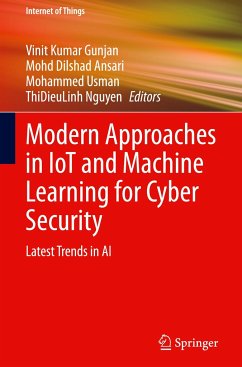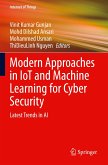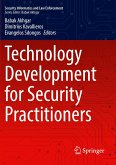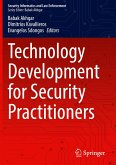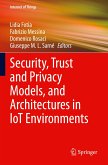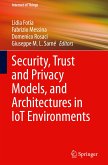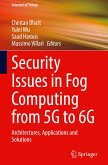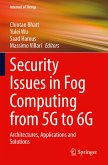Modern Approaches in IoT and Machine Learning for Cyber Security
Latest Trends in AI
Herausgegeben:Gunjan, Vinit Kumar; Ansari, Mohd Dilshad; Usman, Mohammed; Nguyen, ThiDieuLinh
Modern Approaches in IoT and Machine Learning for Cyber Security
Latest Trends in AI
Herausgegeben:Gunjan, Vinit Kumar; Ansari, Mohd Dilshad; Usman, Mohammed; Nguyen, ThiDieuLinh
- Gebundenes Buch
- Merkliste
- Auf die Merkliste
- Bewerten Bewerten
- Teilen
- Produkt teilen
- Produkterinnerung
- Produkterinnerung
This book examines the cyber risks associated with Internet of Things (IoT) and highlights the cyber security capabilities that IoT platforms must have in order to address those cyber risks effectively. The chapters fuse together deep cyber security expertise with artificial intelligence (AI), machine learning, and advanced analytics tools, which allows readers to evaluate, emulate, outpace, and eliminate threats in real time. The book's chapters are written by experts of IoT and machine learning to help examine the computer-based crimes of the next decade. They highlight on automated…mehr
Andere Kunden interessierten sich auch für
![Modern Approaches in IoT and Machine Learning for Cyber Security Modern Approaches in IoT and Machine Learning for Cyber Security]() Modern Approaches in IoT and Machine Learning for Cyber Security119,99 €
Modern Approaches in IoT and Machine Learning for Cyber Security119,99 €![Technology Development for Security Practitioners Technology Development for Security Practitioners]() Technology Development for Security Practitioners52,99 €
Technology Development for Security Practitioners52,99 €![Technology Development for Security Practitioners Technology Development for Security Practitioners]() Technology Development for Security Practitioners75,99 €
Technology Development for Security Practitioners75,99 €![Security, Trust and Privacy Models, and Architectures in IoT Environments Security, Trust and Privacy Models, and Architectures in IoT Environments]() Security, Trust and Privacy Models, and Architectures in IoT Environments134,99 €
Security, Trust and Privacy Models, and Architectures in IoT Environments134,99 €![Security, Trust and Privacy Models, and Architectures in IoT Environments Security, Trust and Privacy Models, and Architectures in IoT Environments]() Security, Trust and Privacy Models, and Architectures in IoT Environments134,99 €
Security, Trust and Privacy Models, and Architectures in IoT Environments134,99 €![Security Issues in Fog Computing from 5G to 6G Security Issues in Fog Computing from 5G to 6G]() Security Issues in Fog Computing from 5G to 6G75,99 €
Security Issues in Fog Computing from 5G to 6G75,99 €![Security Issues in Fog Computing from 5G to 6G Security Issues in Fog Computing from 5G to 6G]() Security Issues in Fog Computing from 5G to 6G75,99 €
Security Issues in Fog Computing from 5G to 6G75,99 €-
-
-
This book examines the cyber risks associated with Internet of Things (IoT) and highlights the cyber security capabilities that IoT platforms must have in order to address those cyber risks effectively. The chapters fuse together deep cyber security expertise with artificial intelligence (AI), machine learning, and advanced analytics tools, which allows readers to evaluate, emulate, outpace, and eliminate threats in real time. The book's chapters are written by experts of IoT and machine learning to help examine the computer-based crimes of the next decade. They highlight on automated processes for analyzing cyber frauds in the current systems and predict what is on the horizon. This book is applicable for researchers and professionals in cyber security, AI, and IoT.
Produktdetails
- Produktdetails
- Internet of Things
- Verlag: Springer / Springer International Publishing / Springer, Berlin
- Artikelnr. des Verlages: 978-3-031-09954-0
- 1st edition 2024
- Seitenzahl: 428
- Erscheinungstermin: 8. Dezember 2023
- Englisch
- Abmessung: 241mm x 160mm x 29mm
- Gewicht: 805g
- ISBN-13: 9783031099540
- ISBN-10: 3031099540
- Artikelnr.: 64122808
- Herstellerkennzeichnung
- Springer-Verlag GmbH
- Tiergartenstr. 17
- 69121 Heidelberg
- ProductSafety@springernature.com
- Internet of Things
- Verlag: Springer / Springer International Publishing / Springer, Berlin
- Artikelnr. des Verlages: 978-3-031-09954-0
- 1st edition 2024
- Seitenzahl: 428
- Erscheinungstermin: 8. Dezember 2023
- Englisch
- Abmessung: 241mm x 160mm x 29mm
- Gewicht: 805g
- ISBN-13: 9783031099540
- ISBN-10: 3031099540
- Artikelnr.: 64122808
- Herstellerkennzeichnung
- Springer-Verlag GmbH
- Tiergartenstr. 17
- 69121 Heidelberg
- ProductSafety@springernature.com
Vinit Kumar Gunjan, Dean of Academics and Associate Professor in Department of Computer Science & Engineering at CMR Institute of Technology Hyderabad (Affiliated to Jawaharlal Nehru Technological University, Hyderabad). An active researcher; published research papers in IEEE, Elsevier & Springer Conferences, authored several books and edited volumes of Springer series, most of which are indexed in SCOPUS database. Awarded with the prestigious Early Career Research Award in the year 2016 by Science Engineering Research Board, Department of Science & Technology Government of India. Senior Member of IEEE, An active Volunteer of IEEE Hyderabad section; volunteered in the capacity of Treasurer, Secretary & Chairman of IEEE Young Professionals Affinity Group & IEEE Computer Society. Was involved as organizer in many technical & non-technical workshops, seminars & conferences of IEEE & Springer. During the tenure I had an honour of working with top leaders of IEEE and awarded with best IEEE Young Professional award in 2017 by IEEE Hyderabad Section. Mohd Dilshad Ansari is currently working as Associate Professor in the Department of Computer Science & Engineering at SRM University Delhi-NCR, Sonepat, Haryana, India. He received B.Tech in Information Technology from Uttar Pradesh Technical University, Lucknow, UP in 2009. He received his M.Tech and Ph.D. in Computer Science & Engineering from Jaypee University of Information Technology, Waknaghat, Solan, HP, India in 2011 and 2018 respectively. He has more than 8 years of Academic/ Research Experience and published more than 30 papers in International Journals (SCIE/Scopus), conferences (IEEE/Springer). He is the Member of various Technical/Professional societies such as IEEE, UACEE and IACSIT. He has been appointed as Editorial/Reviewer Board and Technical Programme Committee member in various reputed Journals/Conferences. He is also Guest Editor of Special Issues from Reputed Journals and Organized Special Sessions in IEEE/Springer Conferences. His research interest includes Digital & Fuzzy Image Processing, Machine Learning, IoT and Cloud Computing. Mohammed Usman received B.E in Electronics and Communications from Madras University, India in 2002. He received his M.Sc and PhD from University of Strathclyde, UK in 2003 and 2008 respectively. He is the recipient of the University scholarship from Strathclyde for his PhD. He has more than a decade of experience in academics and academic administration. He is a senior member of IEEE and IEEE Communications Society. He has been TPC chair and organizing chair for IEEE conferences and actively involved in IEEE activities. He is currently working as Assistant Professor in the department of Electrical Engineering at King Khalid University, Saudi Arabia. He received the & academic excellence' award from the College of Engineering at King Khalid University and also received the award for best project in 2016. A senior design project under his supervision received the talent and innovation award in 2018.His research is focused on technologies for next generation wireless networks, signal processing for biomedical application, probabilistic modeling and channel coding. Nguyen ThiDieuLinh, Ph.D. is working in the Division of Electronics and Telecommunication Engineering in Electronics and Information, Faculty of Electronics Engineering Technology, Hanoi University of Industry, Vietnam (HaUI). Currently She is heading the department since 2015. She has more than 17 years of academic experience in electronics, IoT, Smart Garden and telecommunication. She has authored or co-authored more than 15 research articles that are published injournals, books and conference proceedings. .She teaches graduate & post graduate level courses at HaUI, Viet Nam. She received Ph.D in Information and Communication Engineering from Harbin Institute of Technology, Harbin, China in 2013; Master of Electronic Engineering from Le Quy Don Technical University, Hanoi, Vietnam in 2006 and Bachelor of Electronic Engineering from HCMC University of Technology and Education, Vietnam in 2004. She is an editor for "Artificial Intelligence Trends for Data Analytics Using Machine Learning and Deep Learning Approaches" and "Distributed Artificial Intelligence: A Modern Approach" publisher by Taylor & Francis Group, LLC, USA. She is also board member with International Journal of Hyperconnectivity and the Internet of Things (IJHIoT) IGI-Global, USA, Information Technology Journal, Mobile Networks and Application Journal and some other reputed journal and international conferences.
Introduction.- Being secure, vigilant and resilient in the age of Industry 4.0.- Facing new cyber risks in the age of smart production.- Leveraging AI for threat detection.- Being resilient when attacks inevitably hit home.- Security for the Industrial Internet of Things.- Reinventing the Internet to Secure the Digital Economy.- The future of cybersecurity.- Adapting data science for security challenges.- Big data analytics for cybersecurity.- Data Analytics and Decision Support for Cybersecurity.- Data Science in Cybersecurity and Cyberthreat Intelligence.- Integrating cyber security and data science for social media.- Data warehousing and data mining techniques for cyber security.- Machine learning and deep learning methods for cybersecurity.- Machine Learning and Big Data Processing for Cybersecurity Data Analysis.- Blockchain's roles in strengthening cybersecurity and protecting privacy.- Using virtual environments for the assessment of cybersecurity issues in IoT scenarios.- Security considerations for secure and trustworthy smart home system in the IoT environment.- Cyber security challenges for IoT-based smart grid networks.- Evaluating critical security issues of the IoT world.- Internet of Things security and forensics.- Applying Artificial Intelligence Techniques to Prevent Cyber Assaults.- Cyber security and the role of intelligent systems in addressing its challenges.- Cyber security of water SCADA systems.- Bio-inspiring cyber security and cloud services.- AI enabled blockchain smart contracts.- Cyber security and the evolution in intrusion detection systems.- A cyber security study of a SCADA energy management system.- Security analysis and recommendations for AI/ML enabled automated cyber medical systems.- Making knowledge tradable in edge-AI enabled IoT.- Artificial intelligence and national security.- Conclusion.
Introduction.- Being secure, vigilant and resilient in the age of Industry 4.0.- Facing new cyber risks in the age of smart production.- Leveraging AI for threat detection.- Being resilient when attacks inevitably hit home.- Security for the Industrial Internet of Things.- Reinventing the Internet to Secure the Digital Economy.- The future of cybersecurity.- Adapting data science for security challenges.- Big data analytics for cybersecurity.- Data Analytics and Decision Support for Cybersecurity.- Data Science in Cybersecurity and Cyberthreat Intelligence.- Integrating cyber security and data science for social media.- Data warehousing and data mining techniques for cyber security.- Machine learning and deep learning methods for cybersecurity.- Machine Learning and Big Data Processing for Cybersecurity Data Analysis.- Blockchain's roles in strengthening cybersecurity and protecting privacy.- Using virtual environments for the assessment of cybersecurity issues in IoT scenarios.- Security considerations for secure and trustworthy smart home system in the IoT environment.- Cyber security challenges for IoT-based smart grid networks.- Evaluating critical security issues of the IoT world.- Internet of Things security and forensics.- Applying Artificial Intelligence Techniques to Prevent Cyber Assaults.- Cyber security and the role of intelligent systems in addressing its challenges.- Cyber security of water SCADA systems.- Bio-inspiring cyber security and cloud services.- AI enabled blockchain smart contracts.- Cyber security and the evolution in intrusion detection systems.- A cyber security study of a SCADA energy management system.- Security analysis and recommendations for AI/ML enabled automated cyber medical systems.- Making knowledge tradable in edge-AI enabled IoT.- Artificial intelligence and national security.- Conclusion.

